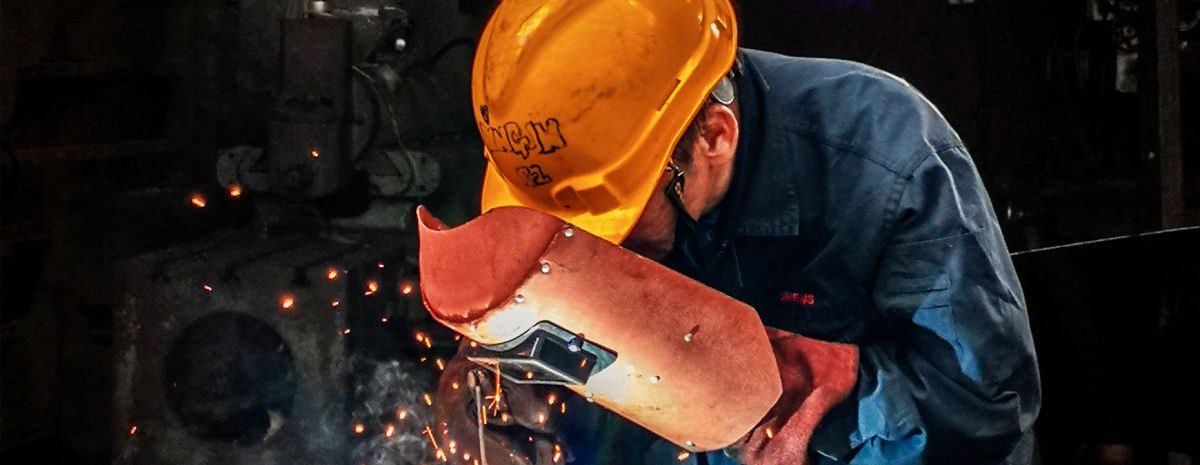TWS is a Great Training Option for Everyone
Learn more about how we can prepare you to advance your career.
The trades can often offer a faster route to a promising career than professions requiring a 4-year degree.
If you’re considering vocational training, you might be wondering which trade is the hardest to learn.
Let’s take a look at three popular trades occupations—welder, HVAC technician and electrician–and the various skills and training required for each.
The Benefits of Learning a Trade
Before taking a deep dive into what separates three specific trades, it’s helpful to highlight some advantages that typically apply to all trades.
Have You Considered a Career in the Skilled Trades?
Fill out the form to recieve a no obligation info packet.
Affordable Training
Professionals who attend four-year colleges are often saddled with crushing debts, which they spend much of their early career paying off. Because trade school training is often faster than getting a university degree, it could prove more affordable, which leads us to the second point.
Healthy Earning Potential
There’s an unfortunate misconception that a tradesperson has to be resigned to earning less than his or her college-degree-holding counterparts. In reality, trades careers can offer as healthy of an earning potential as many occupations requiring a college degree.
Career Advancement Opportunities
Skilled tradespeople who are willing to put in the effort to hone their skills while offering excellent services can often enjoy opportunities for career advancement.
What It Can Take to Be a Skilled Trades Worker
Understanding the responsibilities and requirements to work in the various trades can help give you can idea of what you might have to learn to enter them. This can help you gauge how difficult learning a specific trade might be considering your current skills, knowledge and preferences.
Below you’ll get an idea of the skills you could have to learn to become a welder, HVAC technician or electrician.

New: Industrial Maintenance
Learn About Our New Advanced Industrial Maintenance Program in Houston
Tulsa Welding School is proud to announce our newest program offering available at our Houston Campus – Advanced Industrial Maintenance Technology! Learn the skills you need to take on the industries of manufacturing, distribution, energy production and facility maintenance in as few as 7 months.
Welder

If you like variety, you might want to consider becoming a professional welder. Welders fuse pieces of metal together in a variety of industries, including construction and manufacturing. As a welder, you could work on any number of applications: aircraft welding, buildings, ships, cars and more.
In order to carry out these projects, welders need to calculate measurements and evaluate blueprints. Below is a list of other skills welders may need on a daily basis:
Required Welder Skills
- Make sense of 3D and 2D diagrams.
- Trim and cut metal parts.
- Have good hand-eye coordination.
- Possess reliable vision and depth perception.
- Be able to notice changes in molten metal flows.
- Identify welding joints.
- Keep a steady hand.
HVAC Technician

If you like mechanics and enjoy using your hands in the course of the workday, you might be the perfect candidate for a career in HVAC service and repair.
As a technician, you could repair, install and service HVAC systems. These job duties usually require the following skillset:
Required HVAC Technician Skills
- Understand blueprints and schematics.
- Handle equipment (humidity recorders, airflow meters, hammers, etc.).
- Troubleshoot systems to identify potential issues and solutions.
- Avoid accidents by correctly evaluating hazards.
- Understand the ins and outs of HVAC systems and related controls.
- Stay ahead of the trends in the industry.
Electrician

As an electrician, you could be faced with complex problems on a regular basis. If you’re a natural problem solver, becoming an electrician might be the best way into the trades for you.
A career in wiring could have you troubleshooting why an outlet is sparking or the most efficient way to install electrical systems in a new building on any given day.
Required Electrician Skills
- Install switches, tubing, cables, conduits, etc.
- Understand and read blueprints.
- Use power tools correctly.
- Adhere to electrical safety guidelines.
- Work with wiring, light fixtures and related equipment.
- Operate in tighter spaces while crouched or bent over.
How to Learn a Trade: A Look at Training Requirements for 3 Skilled Trades
These days, trade school is becoming a common step in the path to becoming a skilled trades worker. At least this can be the case for welders, HVAC technicians and electricians.
When evaluating how hard it might be to learn a trade, it can be a good idea to look at the training and licensing requirements for that occupation.
Welder Training Requirements
It’s common for welders to receive welding training and on-the-job training. They usually need a GED or high school diploma.
Many private schools and technical institutes offer welding training for those interested in joining the trade. This education can have its rewards because employers generally prefer to hire applicants who have been through technical training.1
Some welders might need to earn welding certifications for specialized skills to meet the demands of certain positions. Depending on where you work, the cost of welding certification might even be covered.
HVAC Technician Training Requirements
Typically, HVAC technicians complete a postsecondary HVAC training program either at a dedicated trade school or community college. Due to the complex nature of the field, employers usually like to see applicants with HVAC training under their belt.2
When technicians first start out, they generally focus on more basic tasks before moving on to specialized projects.
The Environmental Protection Agency (EPA) requires all techs that deal with refrigerants to earn a certification.3 Additional licensing might be required by state and local agencies.
Electrician Training Requirements
Electricians are required to have a high school diploma or GED.4
Electrician training can be the first step to becoming an electrician. In these technical programs, you can gain knowledge about safety protocols, circuitry and electrical information.4
Credits earned in an electrician training program may be applied toward an electrician apprenticeship, which can be the next step for many electricians. Apprenticeships typically last for 4 to 5 years.4
The majority of states have licensing tests electricians need to pass in order to work.4
The Most Difficult Trade to Learn?
With a deeper understanding of what it could take to work in 3 popular trades, it’s time to answer the question: What is the hardest trade to learn?
In reality, the difficulty of learning each trade can vary between individuals. Based on your unique skills and preferences, one trade might be easier to learn than another.
Before entering into a field, it’s important to take stock of your personal strengths, interests and resources. Then you can compare these factors to the specific requirements of each trade and determine which is best for you.
If you’re interested in entering into a trade, feel free to reach out to Tulsa Welding School to learn about its skilled trades training programs. You can get in contact with a rep at 1-855-237-7675.
1 https://www.bls.gov/ooh/production/welders-cutters-solderers-and-brazers.htm#tab-4
2 https://www.bls.gov/ooh/installation-maintenance-and-repair/heating-air-conditioning-and-refrigeration-mechanics-and-installers.htm#tab-4
3 https://www.epa.gov/section608/section-608-technician-certification-0
4 https://www.bls.gov/ooh/construction-and-extraction/electricians.htm#tab-4
This blog has been labeled as archived as it may no longer contain the most up-to-date data. For a list of all current blog posts, please visit our blog homepage at https://www.tws.edu/blog/







